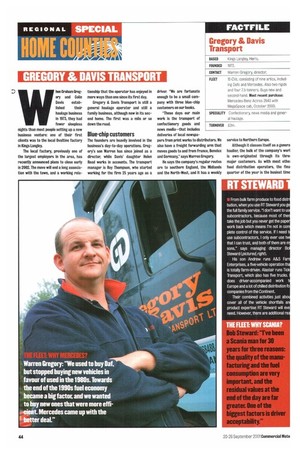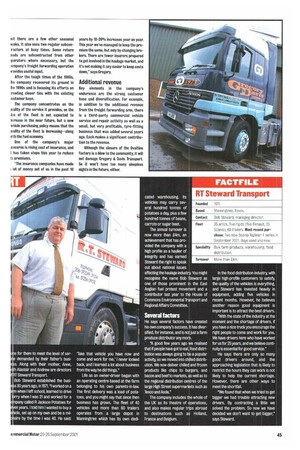GREGORY 80 DAVIS TRANSPORT
Page 44

Page 45

If you've noticed an error in this article please click here to report it so we can fix it.
vif hen Graham Greg
ory and Colin Davis estab lished their haulage business in 1973, they had fewer sleepless nights than most people setting up a new business venture: one of their first clients was to the local Ovaltine factory in Kings Langley.
The local factory, previously one of the largest employers in the area, has recently announced plans to close early in 2002. The move will end a long association with the town, and a working rela
tionship that the operator has enjoyed in more ways than one since its first day.
Gregory & Davis Transport is still a general haulage operator and still a family business, although now in its second home. The first was a mile or so down the road.
Blue-chip customers
The founders are heavily involved in the business's day-to-day operations. Gregory's son Warren has since joined as a director, while Davis' daughter Helen Read works in accounts. The transport manager is Roy Thompson, who started working for the firm 25 years ago as a driver. ''We are fortunate enough to be a small company with three blue-chip customers on our books. SPECIALITY TURNOVER "These days our main work is the transport of confectionery goods and news media—that includes deliveries of local newspapers from print works to distributors. We also have a freight forwarding arm that moves goods to and from France, Benelux and Germany," says Warren Gregory.
He says the company's regular routes are to southern England. the Midlands and the North-West, and it has a weekly service to Northern Europe.
Although it classes itself as a genera haulier, the bulk of the company's warl is own-originated through its threi major customers. As with most other food distribution operators, the fina quarter of the year is the busiest time out there are a few other seasonal peaks. It also uses two regular subconr icters at busy times. Some return aids are subcontracted from other 11.1erators where necessary, but the :umpany's freight forwarding operation wovides useful input.
After the tough times of the 1980s, to company recovered its ground in e 1990s and is focusing its efforts on :mating closer ties with the existing :ustomer base.
The company concentrates on the inky of the service it provides, so the .ize of the fleet is not expected to ncrease in the near future, but a new 'chicle purchasing policy means that the 'tardy of the fleet is increasing—along rith the fuel economy.
One of the company's major pncerns is rising cost of insurance, and t has taken steps this year to reduce ts premiums.
"The insurance companies have made lot of money out of us in the past 10 years by 10-20% increases year on year. This year we've managed to keep the premium the same, but only by changing brokers. There are fewer insurers prepared to get involved in the haulage market, and it's not making it any easier to keep costs down," says Gregory.
Additional revenue
Key elements in the company's endurance are the strong customer base and diversification. For example, in addition to the additional revenue from the freight forwarding arm, there is a third-party commercial vehicle service and repair activity as well as a small, but very profitable, tyre-fitting business that was added several years ago. Each makes a significant contribution to the revenue.
Although the closure of the Ovaltine factory is a blow to the community, it will not damage Gregory & Davis Transport. So it won't have too many sleepless nights in the future, either.




































































































































